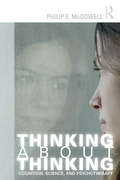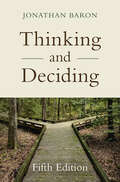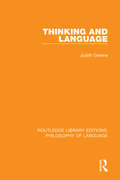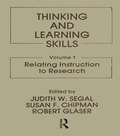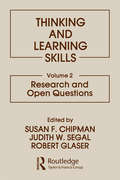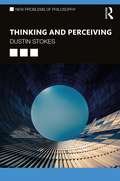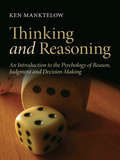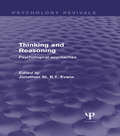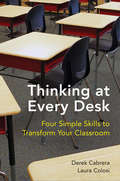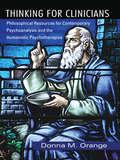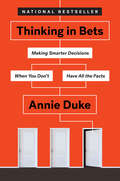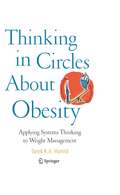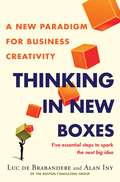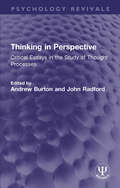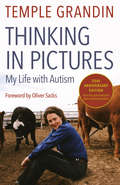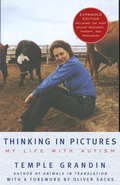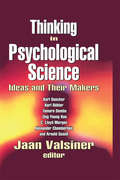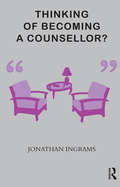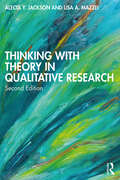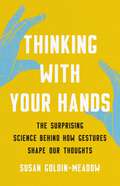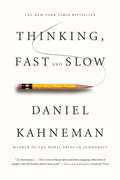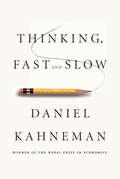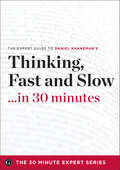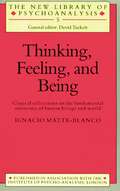- Table View
- List View
Thinking about Thinking: Cognition, Science, and Psychotherapy
by Philip E. McDowellThis book examines cognition with a broad and comprehensive approach. Drawing upon the work of many researchers, McDowell applies current scientific thinking to enhance the understanding of psychotherapy and other contemporary topics, including economics and healthcare. Through the use of practical examples, his analysis is accessible to a wide range of readers. In particular, clinicians, physicians, and mental health professionals will learn more about the thought processes through which they and their patients assess information.
Thinking and Deciding
by Jonathan BaronBeginning with its first edition and through subsequent editions, Thinking and Deciding has established itself as the required text and important reference work for students and scholars of human cognition and rationality. In this, the fourth edition, Jonathan Baron retains the comprehensive attention to the key questions addressed in the previous editions - How should we think? What, if anything, keeps us from thinking that way? How can we improve our thinking and decision making? - and his expanded treatment of topics such as risk, utilitarianism, Baye's theorem, and moral thinking. With the student in mind, the fourth edition emphasises the development of an understanding of the fundamental concepts in judgement and decision making. This book is essential reading for students and scholars in judgement and decision making and related fields, including psychology, economics, law, medicine, and business.
Thinking and Deciding
by Jonathan BaronThe fifth edition of the classic text Thinking and Deciding updates the broad overview of the field of judgments and decisions offered in previous editions. It covers the normative standards used to evaluate conclusions, such as logic, probability, and various forms of utility theory. It explains descriptive accounts of departures from these standards, largely in terms of principles of cognitive psychology, emphasizing the distinction between search processes and inferences. Chapters cover decisions under risk, decision analysis, moral decisions and social dilemmas, and decisions about the future. Although the book assumes no particular prerequisites beyond introductory high-school algebra, it is most suited to advanced undergraduates, early graduate students, and active researchers in related fields, such as business, politics, law, medicine, economics, and philosophy.
Thinking and Language: Topics In Cognitive Psychology (New Essential Psychology Ser.)
by Judith GreeneOriginally published in 1875, this book discusses thinking and language and traces the development of different pscyological approaches, assessing their theoretical significance and the experimental evidence behind them. It ends by drawing together the various lines of argument to arrive at some general conclusions about language and thought, since it clearly emerges that the two are inextricably linked.
Thinking and Learning Skills: Volume 1: Relating Instruction To Research (Psychology of Education and Instruction Series)
by Judith W. Segal, Susan F. Chipman and Robert GlaserFirst Published in 1985. Routledge is an imprint of Taylor & Francis, an informa company.
Thinking and Learning Skills: Volume 2: Research and Open Questions (Psychology of Education and Instruction Series)
by Susan F. Chipman and Judith W. Segal and Robert Glaser"First Published in 1985, Routledge is an imprint of Taylor & Francis, an informa company."
Thinking and Perceiving (New Problems of Philosophy)
by Dustin StokesHuman beings are in contact with the world through their minds. One can make sensory perceptual contact with the world: One sees the tree and hears its leaves flutter. And one makes cognitive contact with the world: One forms beliefs about the tree, memories of how it was in the past, and expectations of how it will be in the future. Can the first, perception, be influenced in important ways by the second, cognition? Do cognitive states such as memories, beliefs, and expectations affect what one perceives through the senses? And what is the importance of these possible relations to how we theorize and understand the human mind? Possible cognitive influence on perception (sometimes called "cognitive penetration of perception") has been long debated in philosophy of mind and cognitive science: Some argue that such influence occurs, while others argue that it does not or cannot. In this excellent introduction and overview of the problem, Dustin Stokes examines the following: The philosophical and scientific background to cognition and perception Contemporary ways of distinguishing cognition and perception Questions about the representational content of perception versus cognition Distinct theories of mental architecture: modularity versus malleability Consequences for epistemology, philosophy of science, and aesthetics Philosophical and scientific research on perceptual attention Perceptual skill, learning, and expertise Perceptual content, objectivity, and cultural bias. Additional features, such as chapter summaries, suggestions for further reading, and a glossary, make Thinking and Perceiving an ideal resource for students of philosophy of mind and psychology, cognitive psychology, and cognitive science.
Thinking and Reasoning: An Introduction to the Psychology of Reason, Judgment and Decision Making
by Ken Manktelow Niall GalbraithThe area of psychological research reviewed in this book is one that is not only increasing in popularity in college curricula, but is also making an ever larger impact on the world outside the classroom. Drawing upon research originally cited in Ken Manktelow’s highly successful publication Reasoning and Thinking, this completely rewritten textbook reflects on the revolutionary changes that have occurred in the field in recent years, stemming from the huge expansion in research output, as well as new methods and explanations, and the appearance of numerous books on the subject aimed at the popular market. The main areas covered are probability judgment, deductive and inductive reasoning, decision making, hypothetical thinking and rationality. In each case, the material is almost entirely new, with topics such as the new paradigm in reasoning research, causal reasoning and counterfactual thinking appearing for the first time. The book also presents an extended treatment of decision making research, and contains a chapter on individual and cultural influences on thinking. Thinking and Reasoning provides a detailed, integrated and approachable treatment of this area of cognitive psychology, and is ideal reading for intermediate and advanced undergraduate students; indeed, for anyone interested in how we draw conclusions and make choices.
Thinking and Reasoning: Psychological Approaches (Psychology Revivals)
by Jonathan St. B.T. EvansThe subject of thinking is the oldest in the whole science of psychology, going back to well before the separation of the disciplines of philosophy and psychology. Originally published in 1983, this collection of up-to-date critical essays about thinking – with particular emphasis on reasoning – is written from the perspective of psychologists who are themselves actively engaged in research into the nature of human thought. The editor’s introduction identifies the major issues which have traditionally concerned students of human thought, and provides an historical background. It describes how at first the subject was studied by introspection, and how this method fell into disrepute at the end of last century. A satisfactory alternative has not yet emerged, although much recent work is based on the information-processing model, which sees the brain as a sophisticated computer. Consequently the papers presented in this volume deal with a wide range of issues, and a number of different experimental tasks and paradigms. They cover most current approaches to the theory and methodology of cognitive psychology, including problem solving, the relationship between language and thought, and reasoning.
Thinking at Every Desk: Four Simple Skills to Transform Your Classroom
by Laura Colosi Derek CabreraCutting-edge skills for twenty-first-century learners and educators. Designed to transform teaching practice, this book provides the tools to understand thinking patterns and how learning actually happens. It empowers teachers to structure learning in the most meaningful way, helping students explore new paths to knowledge.
Thinking for Clinicians: Philosophical Resources for Contemporary Psychoanalysis and the Humanistic Psychotherapies
by Donna M. OrangeThinking for Clinicians provides analysts of all orientations with the tools and context for working critically within psychoanalytic theory and practice. It does this through detailed chapters on some of the philosophers whose work is especially relevant for contemporary theory and clinical writing: Emmanuel Levinas, Martin Buber, Ludwig Wittgenstein, Maurice Merleau-Ponty, and Hans-Georg Gadamer. Orange presents the historical background for their ideas, along with clinical vignettes to help contextualize their theories, further grounding them in real-world experience. With a hermeneutic sensibility firmly in mind, Thinking for Clinicians rewards as it challenges and will be a valuable reference for clinicians who seek a better understanding of the philosophical bases of contemporary psychoanalytic theory.
Thinking in Bets: Making Smarter Decisions When You Don't Have All the Facts
by Annie DukePoker champion turned business consultant Annie Duke teaches you how to get comfortable with uncertainty and make better decisions as a result.In Super Bowl XLIX, Seahawks coach Pete Carroll made one of the most controversial calls in football history: With 26 seconds remaining, and trailing by four at the Patriots' one-yard line, he called for a pass instead of a hand off to his star running back. The pass was intercepted and the Seahawks lost. Critics called it the dumbest play in history. But was the call really that bad? Or did Carroll actually make a great move that was ruined by bad luck?Even the best decision doesn't yield the best outcome every time. There's always an element of luck that you can't control, and there is always information that is hidden from view. So the key to long-term success (and avoiding worrying yourself to death) is to think in bets: How sure am I? What are the possible ways things could turn out? What decision has the highest odds of success? Did I land in the unlucky 10% on the strategy that works 90% of the time? Or is my success attributable to dumb luck rather than great decision making? Annie Duke, a former World Series of Poker champion turned business consultant, draws on examples from business, sports, politics, and (of course) poker to share tools anyone can use to embrace uncertainty and make better decisions. For most people, it's difficult to say "I'm not sure" in a world that values and, even, rewards the appearance of certainty. But professional poker players are comfortable with the fact that great decisions don't always lead to great outcomes and bad decisions don't always lead to bad outcomes.By shifting your thinking from a need for certainty to a goal of accurately assessing what you know and what you don't, you'll be less vulnerable to reactive emotions, knee-jerk biases, and destructive habits in your decision making. You'll become more confident, calm, compassionate and successful in the long run.
Thinking in Circles about Obesity: Applying Systems Thinking to Weight Management
by Tarek K. HamidThinking in Circles About Obesity has been "Highly Commended" in the "Popular Medicine" category of the 2010 BMA Book Awards. Low-carb...low-fat...high-protein...high-fiber...Americans are food-savvy, label-conscious, calorie-aware--and still gaining weight in spite of all their good intentions. Worse still, today's children run the risk of a shorter life expectancy than their parents. Thinking in Circles About Obesity brings a healthy portion of critical thinking, spiced with on-target humor and lively graphics, to the obesity debate. Systems scholar Tarek Hamid proposes that a major shift in perspective is needed to address the problem. This book unites systems (non-linear) thinking and information technology to provide powerful insights and practical strategies for managing our bodies, as well as our health. Applying these creative, business-tested techniques to personal health lets readers approach weight problems like CEOs--not bean-counters!--and connect the elusive links between the biological, environmental, social, and psychological factors that contribute to overweight and obesity, yo-yo dieting and willpower issues. The author's clear insights dispel dieters' unrealistic expectations and illuminate dead-end behaviors to tap into a deeper understanding of how the body works, why it works that way, and how to improve the bottom line. For optimum results, he includes innovative tools for: Understanding why diets almost always fall short of our expectations. Assessing weight gain, loss, and goals with greater accuracy. Abandoning one-size-fits-all solutions in lieu of personal solutions that do fit. Replacing outmoded linear thinking with feedback systems thinking. Getting the most health benefits from information technology. Making behavior and physiology work in sync instead of in opposition. Given the current level of the weight crisis, the ideas in Thinking in Circles About Obesity have much to offer the clinical or health psychologist, the primary care physician, the public health professional the parent and the lay reader. For those struggling with overweight, this book charts a new path in health decision-making, to see beyond calorie charts, Body Mass Indexes, and silver bullets.
Thinking in New Boxes: A New Paradigm for Business Creativity
by Alan Iny Luc De BrabandereWhen BIC, manufacturer of disposable ballpoint pens, wanted to grow, it looked for an idea beyond introducing new sizes and ink colors. Someone suggested lighters. LIGHTERS? With an idea that seemed crazy at first, that bright executive, instead of seeing BIC as a pen company--a business in the PEN "box"--figured out that there was growth to be found in the DISPOSABLE "box." And he was right. Now there are disposable BIC lighters, razors, even phones. The company opened its door to a host of opportunities. IT INVENTED A NEW BOX. Your business can, too. And simply thinking "out of the box" is not the answer. True ingenuity needs structure, hard analysis, and bold brainstorming. It needs to start THINKING IN NEW BOXES --a revolutionary process for sustainable creativity from two strategic innovation experts from The Boston Consulting Group (BCG). To make sense of the world, we all rely on assumptions, on models--on what Luc de Brabandere and Alan Iny call "boxes." If we are unaware of our boxes, they can blind us to risks and opportunities. This innovative book challenges everything you thought you knew about business creativity by breaking creativity down into five steps: * Doubt everything. Challenge your current perspectives. * Probe the possible. Explore options around you. * Diverge. Generate many new and exciting ideas, even if they seem absurd. * Converge. Evaluate and select the ideas that will drive breakthrough results. * Reevaluate. Relentlessly. No idea is a good idea forever. And did we mention Reevaluate? Relentlessly. Creativity is paramount if you are to thrive in a time of accelerating change. Replete with practical and potent creativity tools, and featuring fascinating case studies from BIC to Ford to Trader Joe's, Thinking in New Boxes will help you and your company overcome missed opportunities and stay ahead of the curve. This book isn't a simpleminded checklist. This is Thinking in New Boxes. And it will be fun. (We promise.) Advance praise for Thinking in New Boxes "Thinking in New Boxes is a five-step guide that leverages the authors' deep understanding of human nature to enable readers to overcome their limitations and both imagine and create their own futures. This book is a must-read for people living and working in today's competitive environment."--Ray O. Johnson, Ph.D., chief technology officer, Lockheed Martin "Thinking In New Boxes discusses what I believe to be one of the fundamental shifts all companies/brands need to be thinking about: how to think creatively, in order to innovate and differentiate our brands. We need to thrive and lead in a world of accelerating change and this book challenges us to even greater creativity in our thinking. One of the best business books I've read in a long time."--Jennifer Fox, CEO, Fairmont Hotels & Resorts "As impressive as teaching new tricks to old dogs, Thinking in New Boxes is both inspirational and practical--a comprehensive, step-by-step guide to sharpening one's wits in order to harness creativity in the workplace."--Peter Gelb, general manager, Metropolitan Opera
Thinking in Perspective: Critical Essays in the Study of Thought Processes (Psychology Revivals)
by John Radford Andrew BurtonOriginally published in 1978, the main task of this book was to consider the psychology of thinking in relation to the various perspectives from which thought processes were studied at the time. It provided an up-to-date and critical evaluation of current experimental studies of thinking organized within a framework which reflects the separate theoretical orientations and methodologies through which these investigations are carried out. This approach will help the reader to become aware of the complex relationship between the theoretical orientations, the problems selected for investigation and the methods used for studying them. An important underlying theme of the book concerns the relationship between the activities of the thinker and the demands of his environment. As far as is known, this was the only textbook on thinking to deal with the subject matter specifically in terms of theoretical approaches and methods of investigation at the time.
Thinking in Pictures, Expanded Edition: My Life with Autism
by Temple Grandin a Foreword by Oliver SacksTemple Grandin, Ph.D., is a gifted animal scientist who has designed one third of all the livestock-handling facilities in the United States. <P> <P> She also lectures widely on autism--because Temple Grandin is autistic, a woman who thinks, feels, and experiences the world in ways that are incomprehensible to the rest of us. <P><P>In this unprecedented book, Grandin delivers a report from the country of autism. Writing from the dual perspectives of a scientist and an autistic person, she tells us how that country is experienced by its inhabitants and how she managed to breach its boundaries to function in the outside world. What emerges in Thinking in Pictures is the document of an extraordinary human being, one who, in gracefully and lucidly bridging the gulf between her condition and our own, sheds light on the riddle of our common identity.
Thinking in Pictures: And Other Reports from My Life with Autism
by Temple GrandinTemple Grandin, Ph.D., is a gifted animal scientist who has designed one-third of all the livestock-handling facilities in the United States. She also lectures widely on autism--because Temple Grandin is autistic, a woman who thinks, feels, and experiences the world in ways that are incomprehensible to the rest of us. In this unprecedented book, Grandin delivers a report from the country of autism. Writing from the dual perspectives of a scientist and an autistic person, she tells us how that country is experienced by its inhabitants and how she managed to breach its boundaries to function in the outside world. What emerges in Thinking in Pictures is the document of an extraordinary human being, one who, in gracefully and lucidly bridging the gulf between her condition and our own, sheds light on the riddle of our common identity.
Thinking in Psychological Science: Ideas and Their Makers
by Karl Bühler Arnold Gesell Karl Duncker Tamara Dembo Zing-Young Kuo C. Lloyd Morgan Alexander Chamberlain"This book explores the development of ideas in psychology's past. It is the initial volume in a series intended to shape such ideas into a valuable resource for the discipline's future. Scientists, in general, are known to ignore their own history, considering it to be a graveyard of failures. In Thinking in Psychological Science, selected ideas of key figures in the cognitive, comparative, and developmental sides of psychology Karl Duncker, Karl Biihler, Tamara Dembo, Zing-Young Kuo, C. Lloyd Morgan, Alexander Chamberlain, and Arnold Gesell are traced, and the social contexts of their ideas are given a collective analysis, focusing on the potential of these ideas for the present state of psychology.Representing the scientist as ""hero"" has become a necessary component when applying for research monies from governmentally controlled funding agencies. Yet the reality is just the opposite: Science is not just the product of ""heroes""; it is the product of many individuals who often search for solutions to basic problems throughout their lifetimes while only a few arrive at breakthroughs. Still, familiarity with the flow of thought in the efforts to solve the basic problems of humankind is necessary for any understanding of creativity. This book analyzes the processes involved in the search for solutions to major theoretical problems of development (Kuo, Gesell), action and cognition (Biihler, Bunker, Dembo), and methodology (Morgan). Ultimately, this is an exciting volume that reveals real science in the making.Thinking in Psychological Science will be of interest to students of the social sciences and intellectual history. It is ideal for graduate and upper-level undergraduate courses in psychology, the sociology of science, and cognitive science."
Thinking of Becoming a Counsellor?
by Jonathan IngramsIf you are thinking of becoming a counsellor, you may be wondering if you could put to good use your own life experience by offering support and understanding to those trying to cope with difficulties that you may have encountered and worked through yourself. The ancient Greek aphorism "know thyself" is immensely important in this regard. For unless counsellors are in harmony with themselves they cannot truly relate to the needs of those they seek to help. It is not enough for the counsellor to play the role of the therapist. He or she has to be the therapist - a very different concept. This book explores the journeys of self-discovery that prompted the pioneering practitioners to direct their skills in particular ways and the influence exerted by their backgrounds, ambitions, and personal histories. The overall objective is to help intending therapists to arrive at an understanding of the inner resources they will need to embark on a counselling career, and to help them determine which approach might best accord with their temperament and lifetime's experience.
Thinking with Theory in Qualitative Research
by Alecia Y. Jackson Lisa A. MazzeiThinking with Theory in Qualitative Research: Second Edition demonstrates how to enact various philosophical concepts in practices of inquiry, effectively opening up the process of thought in qualitative studies. Thinking with Theory in Qualitative Research functions as a refusal of pregiven method, intensifying creativity, experimentation, and newness. Readers are invited into the threshold of theory to traverse philosophers and their concepts, reorienting conventional approaches to inquiry. Each chapter presents a thinking with process as a way of reading intensively through plugging in performative accounts of two first-generation academic women to philosophical concepts from Derrida, Spivak, Foucault, Butler, Barad, and Deleuze and Guattari. This book is a deliberate attempt to unsettle what is expected to be represented or recognized in terms of both meaning and method in traditional practices of qualitative research, which become unproductive and untenable in this different image of thought. New to this edition Fully revised and rewritten Chapter 1 that introduces the technique of plugging in as contingent, strategic movements of thought. Also new to Chapter 1 is a shift in language away from traditional practices in qualitative research (data and analysis) to performative accounts and becoming-questions Fully revised "Thinking with intra-action" chapter, which focuses on Karen Barad’s ontoepistemological framework of agential realism, and the concepts of posthumanist performativity and entangled agencies Fully revised and rewritten Chapter 8 that presents plugging in and thinking with as ontological Further development of and new material on the "plugging in" technique Schematic cues updated and extended for all of the Interludes In the ten years since the first edition was published, Thinking with Theory in Qualitative Research has become a vanguard text in the field of postfoundational inquiry for its accessible but thorough introductions to philosophically informed inquiry. This book is for experienced and novice researchers, and students in introductory, general, and advanced qualitative inquiry courses, who may also be first-time readers of philosophy. This text will function as an entry into techniques of thinking with a new theoretical vocabulary.
Thinking with Your Hands: The Surprising Science Behind How Gestures Shape Our Thoughts
by Susan Goldin-MeadowAn astounding account of how gesture, long overlooked, is essential to how we learn and interact, which &“changes the way you think about yourself and the people around you.&” (Ethan Kross, bestselling author of Chatter) We all know people who talk with their hands—but do they know what they&’re saying with them? Our gestures can reveal and contradict us, and express thoughts we may not even know we&’re thinking. In Thinking with Your Hands, esteemed cognitive psychologist Susan Goldin-Meadow argues that gesture is vital to how we think, learn, and communicate. She shows us, for instance, how the height of our gestures can reveal unconscious bias, or how the shape of a student&’s gestures can track their mastery of a new concept—even when they&’re still giving wrong answers. She compels us to rethink everything from how we set child development milestones, to what&’s admissible in a court of law, to whether Zoom is an adequate substitute for in-person conversation. Sweeping and ambitious, Thinking with Your Hands promises to transform the way we think about language and communication.
Thinking, Fast And Slow
by Daniel KahnemanFirst is fast, intuitive, and emotional; Second is slower, more deliberative, and more logical. The impact of overconfidence on corporate strategies, the difficulties of predicting what will make us happy in the future, the profound effect of cognitive biases on everything from playing the stock market to planning our next vacation--each of these can be understood only by knowing how the two systems shape our judgements and decisions. <p> <b>New York Times Bestseller</b>
Thinking, Fast and Slow
by Daniel Kahneman<P>The guru to the gurus at last shares his knowledge with the rest of us. Nobel laureate Daniel Kahneman's seminal studies in behavioral psychology, behavioral economics, and happiness studies have influenced numerous other authors, including Steven Pinker and Malcolm Gladwell. <P>In Thinking, Fast and Slow, Kahneman at last offers his own, first book for the general public. It is a lucid and enlightening summary of his life's work. It will change the way you think about thinking. <P>Two systems drive the way we think and make choices, Kahneman explains: System One is fast, intuitive, and emotional; System Two is slower, more deliberative, and more logical. Examining how both systems function within the mind, Kahneman exposes the extraordinary capabilities as well as the biases of fast thinking and the pervasive influence of intuitive impressions on our thoughts and our choices. Engaging the reader in a lively conversation about how we think, he shows where we can trust our intuitions and how we can tap into the benefits of slow thinking, contrasting the two-system view of the mind with the standard model of the rational economic agent. <P>Kahneman's singularly influential work has transformed cognitive psychology and launched the new fields of behavioral economics and happiness studies. In this path-breaking book, Kahneman shows how the mind works, and offers practical and enlightening insights into how choices are made in both our business and personal lives--and how we can guard against the mental glitches that often get us into trouble. <P><b>A New York Times Bestseller</b>
Thinking, Fast and Slow . . . in 30 minutes: The Expert Guide
by Daniel KahnemanThinking, Fast and Slow ...in 30 minutes is the essential guide to quickly understanding the important lessons on decision-making outlined in the New York Times best seller Thinking, Fast and Slow. In Thinking, Fast and Slow, author Daniel Kahneman gets to the bottom of how to make good decisions and when to trust your intuition. Kahneman wants readers to avoid putting too much weight on acting quickly on their intuition when making decisions. He presents the concept of humans "thinking fast and slow"—the idea that human thought can be divided into two categories: slow and painstaking thought, and quick, intuitive thought. Through detailed research and real-life examples, Thinking, Fast and Slow teaches readers when to apply each type of thought in order to improve everything from playing the stock market to increasing personal happiness. Thinking, Fast and Slow will change the way you think, and improve the quality of your decisions, both large and small. Understand the key ideas of Thinking, Fast and Slow in a fraction of the time, with tools such as: A concise synopsis examining the principles of Thinking, Fast and Slow In-depth analysis of key concepts behind Thinking, Fast and Slow: the two selves, and the two distinct thinking systems—the intuitive System 1 and the effortful System 2 Illustrative case studies demonstrating Kahneman's groundbreaking research in behavioral economics Real-world applications for applying the theories in Thinking, Fast and Slow to everyday life Critical reception to Thinking, Fast and Slow, highlighting important arguments by major publications and thought leaders As with all books in the 30 Minute Expert Series, this book is intended to be purchased alongside the reviewed title, Thinking, Fast and Slow.
Thinking, Feeling, and Being: Clinical Reflections On The Fundamental Antinomy Of Human Beings And World (New Library of Psychoanalysis #Vol. 5)
by Ignacio Matte-BlancoIgnacio Matte-Blanco has made one of the most original contributions to psychoanalysis since Freud. In this book, which includes an introductory chapter to his work by Eric Rayner and David Tuckett, he develops his conceptualization of the Freudian unconscious in terms of logic and mathematics, giving many clinical examples.
